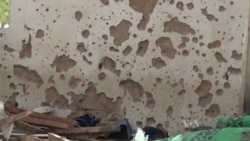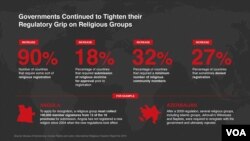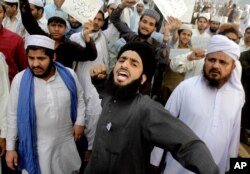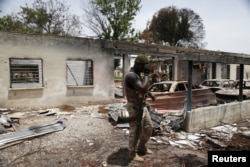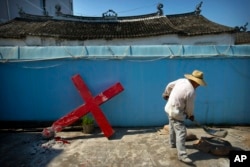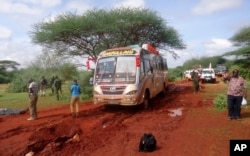The United States is painting a bleak portrait of religious freedom around the world, particularly condemning some Islamic societies that have adopted laws that harshly penalize blasphemy and apostasy.
“One quarter of all the countries in the world have some form of anti-blasphemy law, one out of 10 punishes people for apostasy,” State Department’s Ambassador-at-Large for International Religious Freedom David Saperstein told VOA Wednesday in an interview, “so this is a serious problem because often this has death penalties that are attached in them or very severe punishments. And we see this in countries all across the globe.”
Saperstein underscored that the very nature of all these laws “punishes people for expressing their core beliefs, when those core beliefs turn out to be offensive to whoever has the political power in the country. No one should be punished for expressing their religious views if they do so in a peaceful manner.”
The report said that "false accusations, often lodged in pursuit of personal vendettas or for the personal gain of the accuser, are not uncommon. Mob violence as a result of such accusations is disturbingly common."
"Around the world," the State Department said, "governments continued to tighten their regulatory grip on religious groups, and particularly on minority religious groups and religions which are viewed as not traditional to that specific country."
Countries singled out
The report singled out numerous countries, alleging that governments targeted people for a variety of offenses, including online articles or public statements that allegedly defamed the Prophet Mohammed or desecrated Islam's holy book, the Quran, in some way.
The report said that in Pakistan, 40 people remain on death row for blasphemy, many of them religious minorities.
It said Sudan detained 27 Muslims last November, all "adherents of a school of Islam that maintains that the Quran is the sole source of religious authority, and that rejects the sanctity of the hadiths — contrary to the government’s official view of Islam."
The State Department said Mauritania imprisoned Mohammad Cheikh Ould Mohammad, better known as “MKheytir,” after he allegedly criticized the Prophet Mohammad and "implicitly blamed the country’s religious establishment for the plight of the country’s forgeron (blacksmith) caste, which historically has suffered discrimination." Protesters in the country called for the death of a human rights activist who defended him
The report said that last year two non-state actors, the Islamic State and Boko Haram, "continued to rank amongst the most egregious abusers of religious freedom in the world."
It said Islamic State jihadists have committed what U.S. Secretary of State John Kerry believes to be "genocide against Yazidis, Christians, Shia, and other vulnerable groups in the territory it controlled." The report said it was "responsible for barbarous acts, including killings, torture, enslavement and trafficking, rape and other sexual abuse against religious and ethnic minorities and Sunnis in areas under its control."
“Daesh kills Yazidis because they are Yazidi, Christians because they are Christian, Shia Muslim because they are Shia,” said Deputy Secretary of State Antony Blinken, using another name for Islamic State group, “Daesh is also responsible for crimes against humanity and ethnic cleansing directed at these same groups, and in some cases also against Sunni Muslims, Kurds, other minorities.”
Blinken emphasized “they’ve not only killed, they’ve sought to erase the memory of those they’ve killed, destroying centuries-old religious cultural sites. ”
The State Department said Boko Haram in Africa "continued to launch indiscriminate, violent attacks targeting both Christians and Muslims who spoke out against or opposed their violent ideology."
It noted that "Boko Haram claimed responsibility for scores of attacks on churches and mosques, often killing worshipers during religious services or immediately afterward."
The report denounced Iran, where it said government officials executed 20 individuals "on charges of moharebeh, translatable as 'enmity towards god,' among them a number of Sunni Kurds." It said a number of other prisoners, including several Sunni preachers, are still being held while awaiting a government decision whether to implement their death sentences.
The State Department also disparaged religious freedom in China, saying that Beijing "ordered the demolition of several state-sanctioned Protestant and Catholic churches and the removal of over 1,500 crosses as part of a government campaign targeting so-called 'illegal' structures."
Meanwhile, it said Russia "continued to grant privileges to the Russian Orthodox Church that it did not accord to others," limiting the activities of Muslims and other minority religious groups, such as Jehovah’s Witnesses, Pentecostals and Scientologists.
The State Department said religious freedom is gradually improving in Vietnam and praised the European Union for appointing two officials to monitor anti-Semitism and combat anti-Muslim hatred. The report lauded Kenyan Muslims for shielding Christians when al-Shabab militants attacked a bus they were riding on.





